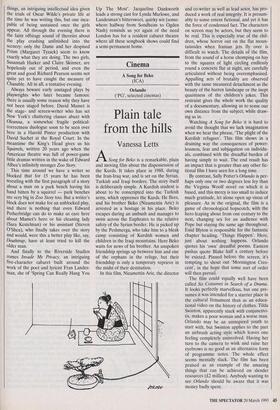Cinema
A Song for Beko (ICA)
Orlando (PG', selected cinemas)
Plain tale from the hills
Vanessa Letts
ASong for Beko is a remarkable, plain and moving film about the dispossession of the Kurds. It takes place in 1988, during the Iran-Iraq war, and is set on the Syrian, Turkish and Iraqi borders. The story itself is deliberately simple. A Kurdish student is about to be conscripted into the Turkish army, which oppresses the Kurds. He flees, and his brother Beko (Nizamettin Aric) is arrested as a hostage in his place. Beko escapes during an ambush and manages to swim across the Euphrates to the relative safety of the Syrian border. He is picked up by the Peshmerga, who take him to a bleak camp consisting of Kurdish women and children in the Iraqi mountains. Here Beko waits for news of his brother. An unspoken friendship springs up between him and one of the orphans in the refuge, but their friendship is only a temporary reprieve in the midst of their destitution.
In this film, Nizamettin Aric, the director
and co-writer as well as lead actor, has pro- duced a work of real integrity. It is presum- ably to some extent fictional, and yet it has the force of condensed fact. The characters on screen may be actors, but they seem to be real. This is especially true of the chil- dren, whose horror out on the flat moun- tainsides when Iranian jets fly over is difficult to watch. The details of the film, from the sound of a horse chomping on hay to the squares of light circling endlessly round a concrete flat at night, are carefully articulated without being overemphasised. Appalling acts of brutality are observed with the same measured detachment as the beauty of the barren landscape or the inept quaintness of the children's jokes. This restraint gives the whole work the quality of a documentary, allowing us to sense our own distance from the subject, while draw- ing us in.
Watching A Song for Beko it is hard to avoid the thought that we lack imagination when we hear the phrase, 'The plight of the Kurdish refugees'. This film shows in a draining way the consequences of power- lessness, fear and subjugation on individu- als, combined with the dreadful burden of having simply to wait. The end result has an impact that is greater than any other fic- tional film I have seen for a long time.
By contrast, Sally Potter's Orlando is per- haps only one or two degrees less fey than the Virginia Woolf novel on which it is based, and this mercy is too small to induce much gratitude, let alone open up vistas of pleasure. As in the original, the film is a game of chronological hopscotch, with the hero leaping about from one century to the next, changing sex for an audience with Pope but staying the same age throughout. Enid Blyton is responsible for the fantastic chapter heading, 'Things Happen'. Here, just about nothing happens. Orlando quotes his 'own' dreadful poems. Eastern pashas quote Blake half a century before he existed. Pinned before the screen, it's tempting to shout out Nornington Cres- cent', in the hope that some sort of order will then prevail.
The film could equally well have been called Six Costumes in Search of a Drama. It looks perfectly marvellous, but one pre- sumes it was intended for a starrier place in the cultural firmament than as an educa- tional video on the history of clothes. Tilda Swinton, apparently stuck with conjunctivi- tis, makes a poor woman and a worse man. Orlando may be an uninspired youth to start with, but Swinton applies to the part an airbrush acting style which leaves one feeling completely uninvolved. Having her turn to the camera to wink and raise her eyebrows is no good as an alternative form of programme notes. The whole effect seems mentally slack. The film has been praised as an example of the amazing things that can be achieved on slender resources (£2 million). Anybody wanting to see Orlando should be aware that it was money badly spent.


























































 Previous page
Previous page